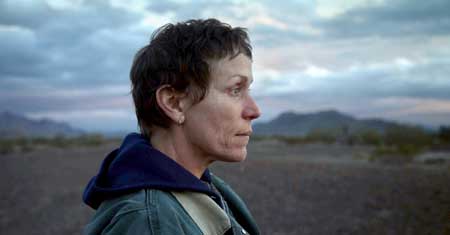Film (2021)
Written and directed by Chloé Zhao
Based on the book by Jessica Bruder
Searchlight Pictures
Music by Ludovico Einaudi; Cinematography by Joshua James Richards; Film Editing by Chloé Zhao
With Frances McDormand (Fern), Linda May (Linda), Bob Wells (Bob), Charlene Swankie (Swankie), David Strathairn (Dave), Peter Spears (Peter)

in “Nomadland”
In 2011, the town of Empire, Nevada has lost its main source of business, a gypsum plant, and, as a result the town has shut down. Fern (Frances McDormand) has not only suffered the indignity of losing her home and town as a result of that, but her beloved husband is dead. She now is a nomad, making do in a van outfitted with a stove, a bed and a makeshift toilet. But she finds community is those like herself who offer a sense of place, however unsettled, and companionship, however unstable. She seems pretty stable in the midst of it all, finding jobs here and there while she vagabonds around the Western United States. At one point she encounters Dave (David Strathairn) who is a nomad as well, and then when he isn’t she has a choice to make.
This austere, dire, intense film has a constant air of poetry about it. There is despair and longing at every turn, but the combination of skillful writing, deft direction and capable editing by Chloé Zhao, and a radiantly penetrating performance by Frances McDormand that lifts it above the dreadful to a plane of elevated resoluteness. Together, these elements combine to show the awfulness of a destroyed life and the absolute non-awfulness of the people who, thrust into its grasp, rise to a level of nobility.
Fern encounters a kind of circled wagon-train of nomads, led by a non-appointed and unofficial minister of the group, Bob (Bob Wells), who leads with a sense of decency and conviction. Thrust into the life of a rootless vagabond, he encourages people to offer help to another and finds inspiration in helping and in helping others to help. There is a kind of down to earth, sincere, devotedness to this man’s spirituality and to the sense he cultivates in Fern and others that resonates deeply. He’s not a cult leader, nor do any of the group treat him that way. He’s merely inspirational.
She also meets various older women who are traveling similar paths, including Swankie (Charlene Swankie), who seems to have a vivid and convincing sense of what it means to survive in a van on the road. At her parting from Fern she talks about the desire, when she dies, to have her friends throw stones in a fire to remember her. Why? Just because she likes stones and it’s a simple, powerful ritual.
This is the kind of honest, straightforward faith that reverberates in this film, so close to the grittiness of the earth, so near to the bone, that one imagines that any departure from it would be unacceptable to one who has known it. And that is why, when Fern encounters Dave and follows him to the edge of hope, that the drama is so vivid. She has learned the loss of almost everything, and the thought of losing that sense of loss is not only terrifying but signifies a kind of retreat from the existential journey she has embarked upon.
When encountered in a sporting goods store by what seems to be a younger family friend accompanied by her children, they ask if Fern is homeless. I’m not homeless, Fern answers. I’m houseless. There’s a difference. The power of this austere, brilliant film is that point exactly – that leaving one’s house does not make one lose one’s place in the world. This testament to that form of rugged confrontation with the world as stripped bare lets us see what greatness and courage there can be in that determination to face the open road, and the constant unknown, head on.
Music, mostly simple but lyrical piano solo, by Ludovico Einaudi is haunting. Cinematography by Joshua James Richards expertly captures the austerity and greyness of landscape. Not only has Chloé Zhao expertly directed the film, but she has edited it expertly as well, simply, without fanfare, in a way that stitches this bleakly compelling tale into a quilt of cosmic hope.
The drama in this film is subtle and penetrating. It’s a kind of simmering that takes few turns but potent ones which seem to fit in with the texture of the tale so realistically that one does not even think of them as dramatic turns. But this is a dramatic film, a potent one, and the constantly shifting landscape of McDormand’s face, its small sunrises and sunsets, make this what it is, a powerful reflection on the human condition that has all the elements of the religious without breathing a word about it.
– BADMan (aka Charles Munitz)
Leave a Reply